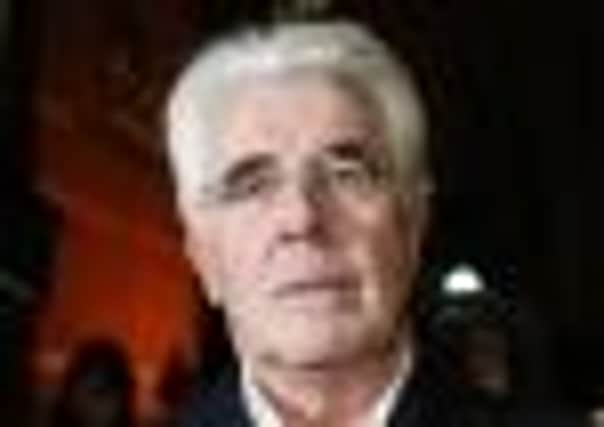Dani Garavelli: ‘Nightmare’ gives Max Clifford opportunity for reflection


Once a seemingly dazzling, if slightly superficial, universe inhabited by big personalities who could hold an audience in the palm of their hand, it’s now a murky cesspit of a place, where sexual abuse was allowed to flourish unchecked. So accustomed have we become to stars whose careers took off in the 60s and 70s being brought in for questioning, we are almost one step ahead of the announcements. As comedy writer Pete Sinclair tweeted yesterday, “Whenever I heard the words ‘the veteran broadcaster...’, I used to think ‘has died’, now I find myself thinking ‘has been arrested.’ ”
Of course, all those interrogated as part of the Yewtree investigation may well be innocent. Still – guilty or innocent – it feels as if our childhood is being systematically trashed. Savile, of course, most of us had always suspected of wrongdoing, while Gary Glitter has already been convicted of possessing child porn. But former Radio 1 DJ, Dave Lee Travis, who was released on bail after being questioned last month? Or Stuart Hall, football pundit and voice of It’s A Knockout, who was last week charged with three counts of indecent assault on girls aged between nine and 16? It’s like a cultural revolution, where all the icons are being toppled in a drive for purification.
Advertisement
Hide AdAdvertisement
Hide AdWhile some of the arrests have evoked dismay, Max Clifford’s detention last week as part of Operation Yewtree, but in connection with allegations unrelated to Savile, has been greeted by a more mean-spirited emotion – a kind of national schadenfreude.
Regardless of the veracity of the claims, the image of a man who has been responsible for many a damaging tabloid splash finding himself in desperate need of his own spin has a piquant symmetry about it. As Clifford, who denies the allegations, talks about the nightmare of being questioned for hours on end, it is difficult not to see it as karma for the pain his stories have caused others.
During his 40-plus years as a publicist, Clifford has been responsible for hundreds of exclusives, negotiating deals for the likes of Rebecca Loos, who claimed to have been having an affair with David Beckham, with little apparent concern for the devastation they may cause.
On several occasions the stories have been made up, the famous “Freddie Star Ate My Hamster” splash, for example, and the claim that David Mellor had sex with Antonia de Sancha in his Chelsea strip (though the revelation about the affair itself was true).
Perhaps most relevant to Clifford’s current plight, however, is his dubious involvement with Nadine Milroy-Sloan, who was convicted of perverting the course of justice in 2003 after fabricating rape claims against Neil and Christine Hamilton. Having told police she had been attacked by the couple and two other men in a flat in Essex, she went on to sell her made-up story to a Sunday newspaper for £50,000, using her decision to “waive her anonymity” as a bargaining tool.
After Milroy-Sloan was jailed for three years, Clifford – who represented both her and Neil Hamilton’s arch-enemy Mohamed al-Fayed – paid the couple an undisclosed sum in libel damages. It was the Milroy-Sloan case, more than any other, which undermined his oft-professed claim to be driven by the need to challenge the hypocrisy of others.
Of course, Clifford’s arrest isn’t really something we should be taking any pleasure in. If he is guilty, and there is nothing at the moment to suggest that is the case, it means someone has suffered at his hands; if he has been falsely accused – well, that’s a fate I wouldn’t wish on any human being.
But, either way, I do hope the ordeal will make him think more carefully about an interview he gave earlier this year in which he claimed more than a dozen stars of the 60s, 70s and 80s had been in touch with him, terrified their names would pop up as part of the Yewtree inquiry.
Advertisement
Hide AdAdvertisement
Hide Ad“These are people who can’t remember what happened last year, never mind 20 or 30 years ago,” he said. “Some of them are really frightened.”
During the course of the interview with Sky’s Stephen Dixon, he seemed to imply – as many others have done before and since – that in those decades, sex with young girls was so common as to be almost culturally acceptable.
“They [pop stars] had gone from working in a factory one week to performing in front of thousands of people and girls who were screaming and throwing themselves at them then,” he said.
“All kinds of things went on, and I do mean young girls throwing themselves at them in their dressing rooms at concert halls, at gigs, whatever. They never asked for anybody’s birth certificate and they were young lads... suddenly everyone’s dream was a reality.”
This is offensive stuff; it perpetuates the idea that a generation ago engaging in sex with underage girls (or boys) was an almost inevitable by-product of fame; it downplays the gravity of the offence and suggests that those who took part were not really responsible for their actions.
Clifford has been released on bail. He said he understood the police had to pursue the allegations, but added: “Anyone who knew me all those years ago will know I would never act in that way.”
It is to be hoped that, whatever happens next, Clifford will see the experience as an opportunity to reflect on his own value system; that in the future he will be less casual when he talks about practices which seem to have been almost endemic in the world of light entertainment, and less willing to trade in the kind of half-truths and invention which have the potential to destroy the lives of others.
Twitter: @DaniGaravelli